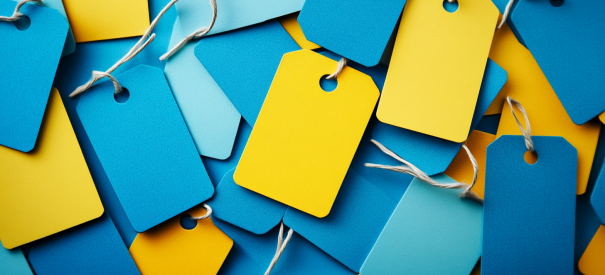TABLE OF CONTENTS
- What is Private Labeling?
- What are Private Label Brands?
- What are the Benefits of Private Label Products?
- Examples of Private Labeling
- What is White Labeling?
- What are the Benefits of White Labeling Products?
- Examples of White Label Products
- White Label vs Private Label: How Are They Similar?
- White Label vs Private Label: How Are They Different?
- Private Label vs White Label: Which is the Better Choice for Your Business?
- Summary: White Labeling vs Private Labeling
If you’re planning on building a new eCommerce business, one of the most challenging elements is sourcing your products. Finding reliable and affordable suppliers is essential to running a successful online business. Fortunately, many manufacturing companies offer production services to eCommerce business owners. This allows you to quickly and affordably access new products to sell. One essential factor to consider is the difference between ‘white label’ vs ‘private label’ products.
In this guide, we take a closer look at these two types of products and the advantages of each option. Understanding the details in this blog will help you make better decisions when you’re sourcing new products for your eCommerce business.
What is Private Labeling?

Private labeling describes purchasing a custom product from a manufacturer. You will have exclusive access to marketing and selling the product with private labeling. This means that you can request specifications that help you build a brand identity.
For example, if you’re building an athletic clothing brand, you may request specific materials, color schemes, and sizes. Private labeling allows you to access custom manufacturing without owning your manufacturing resources.
What are Private Label Brands?
Private label brands are brands that sell custom products manufactured by third-party producers. For example, suppose a company is developing its own shampoo brand and has a custom formula. In that case, the company could send this to a private label producer and instruct them to manufacture it.
The shampoo company itself developed the formula and the product, and the manufacturer is producing it exclusively for the retailer that requested the manufacturing.
What are the Benefits of Private Label Products?
Below, let’s take a look at the core benefits associated with selling private label products to your customers:
- More freedom when choosing design and specifications
- Better opportunities to build your own brand
- Control over materials, which provides control over costs
- Benefit from your own product research
- Respond to your customers’ needs and preferences effectively
- Build long-term relationships with specialist manufacturers that have a vested interest in building high-quality products for your brand
Examples of Private Labeling
To help our readers gain a better understanding of private labeling, we’ve compiled a few real-life examples below:
Kylie Cosmetics
Kylie Jenner continues to be one of the most famous names in the beauty industry. The celebrity and businesswoman launched her own makeup brand under the name Kylie Cosmetics. ColourPop and Kylie Cosmetics both use Spatz Laboratories to produce their makeup. While some news stories suggest that Kylie Cosmetics is white-label, as other makeup brands use the same producer, the formula is different. [1]Genie Supply. “BUSINESS IN COSMETOLOGY: PRIVATE LABEL COSMETICS“. Accessed March 31, 2022. This makeup is produced according to different specifications, which means it’s private label.
AmazonBasics
AmazonBasics is an Amazon brand covering a wide range of products, including phone chargers, batteries, computer products, home goods, and many other items. This low-cost brand has exploded in popularity over the past few years.
While Amazon brands AmazonBasics under its own name, most manufacturing is outsourced to private label companies. These companies produce items according to Amazon’s specifications. Many of the manufacturing partners are located in China and India.[2] OneZero. “Amazon Finally Reveals Who Makes Its Branded Products“. Accessed March 31, 2022.
What is White Labeling?

White label products are produced by a manufacturer and sold to multiple retailers. While there might be small variations, such as the product’s color, white label products are standardized regardless of the retailer. This means that retailers that purchase white label products don’t influence the item’s production.
For example, if a manufacturer produces a white label phone charger, it can sell it to multiple retailers. The retailers can subsequently add their own logos, packaging, and marketing material to build a brand for the product.
As white label manufacturers are experts at producing their goods, they can provide quick and affordable order fulfillment to their retail clients. If you want to source inventory without the need for product design and development, white labeling is an excellent option.
What are the Benefits of White Labeling Products?
- Lower costs, as manufacturers don’t need to incorporate custom requests
- Quick and easy to purchase products – no need to design your own products
- Benefit from your own margin – you set your own markup on generic products
- Benefit from your own branding on the product
- Tap into the industry expertise of manufacturers with experience
Examples of White Label Products
Now that you understand the white label meaning, it’s time to understand it in context. Below, let’s explore a couple of examples of white label products:
White Label Coffee
If you’re passionate about coffee but don’t have connections in the world’s most reputable coffee regions (Colombia, Ethiopia, Kenya, etc.), white-label coffee might be a good alternative. As coffee producers often sell to multiple clients worldwide, this is an excellent example of an industry that’s naturally suitable for a white label business model.
There are already companies that provide white label coffee services to eCommerce businesses. For example, “Dripshipper” provides coffee bean dropshipping services to retailers throughout the United States.[3]Dripshipper. “Benefits and Features“. Accessed March 31, 2022. The company offers coffee beans and packaging, which you can customize with your branding.
White Label Shampoo
Hair shampoo is another product that is excellent for white label retailers. If you want to start a shampoo business without developing a unique product, plenty of online manufacturers sell shampoo and packaging. You can customize the packaging to include your logo and branding.
As with other white label producers, many shampoo producers allow minor customizations, such as various scents or packaging sizes. However, you won’t be able to build your shampoo from scratch with a white-label manufacturer.
White Label vs Private Label: How Are They Similar?
There are many similarities between white label and private label products. Both options allow business owners to outsource their production to manufacturing experts, drastically reducing startup costs and enabling new businesses to enter markets without production experience.
Also, white label and private label retailers both have the chance to develop their own brands and marketing materials. As white label products will also contain unique retailer branding, these can be distinguished from other competitors in the market.
Likewise, white label and private label manufacturing both allow small variations, such as size, color, and other specifications. However, with white labeling, the manufacturer will dictate these variations.
In summary, let’s assess the core similarities between white labeling and private labeling:
- Both involve outsourced production (third-party manufacturers)
- Both allow for individual branding of products
- White labeling and private labeling can allow small variations, such as color and size
White Label vs Private Label: How Are They Different?
While there are core similarities between white labeling and private labeling, it’s the differences that you need to assess before you choose which option is best for your business.
Firstly, the primary difference between white labeling vs private labeling is customization. With white labeling, the manufacturer produces a good and sells it to multiple retailers (with the potential for minor variations). However, with private labeling, customization is possible – in fact, the design and specifications can be handled entirely by the retailer.
While both white label and private label products have branding, private label products can be designed to have specific color schemes, designs, and more, which means they’re better for creating a branding message.
As private label manufacturers are generating products according to the wishes of a retailer, the process can be longer and more expensive. On the other hand, white label products are often manufactured in advance (or are easily manufactured at short notice). This means it can be a more affordable and streamlined process.
In summary, let’s take a quick look at the core differences between white label and private label:
- Private labeling offers much more customization options – you can control the design process
- White labeling can be quicker and cheaper because the manufacturer designs and produces the products
- While white labeling allows unique branding, private labeling ensures the entire design embodies your brand
Private Label vs White Label: Which is the Better Choice for Your Business?
So, now that you understand the key differences between white labeling and private labeling, it’s time to decide which option is most suitable for your business.
If your primary aim is to source products quickly and sell them to customers, like with a dropshipping business model, then white labeling is the most affordable and time-efficient option. You can easily browse thousands of white label products online and find a supplier that meets your budget constraints and timelines. You can also incorporate your own logos and packaging to make your products appear unique.
However, if you want to build a unique and easily-identifiable brand, it’s best to work with a private label producer. These producers can use your design preferences to create a one-of-a-kind product for your business. If you’re in this for the long haul and have the money to invest in unique products, it’s hard to see why you wouldn’t use a private label business model.
Don’t forget that some consumers can feel betrayed when they find out a product is a white label model. If a customer suddenly realizes they can buy your product from another retailer or directly from the producer at a lower price, you’re unlikely to receive any repeat business without a successful loyalty program. This can cause reputational damage to your enterprise.
Also, don’t forget that these aren’t your only two options. Many successful business people also invest in their own manufacturing capacity. While this has substantial upfront costs, it can save money if you develop niche expertise in your product area.
Summary: White Labeling vs Private Labeling
In conclusion, both white labeling and private labeling offer excellent manufacturing opportunities for retailers. If you can’t afford to produce your products in-house, these two types of manufacturing are your best options. However, choosing between white and private labeling can be difficult.
Assess the topics outlined in this guide and determine your business’s near-term priorities. If you start a business as a white label brand, there’s no reason that you can’t change into a private label brand in the future.
Regardless, choosing the best manufacturer to produce your products is essential to building a reputation in your industry. Once you have your product sourcing lined up, you’ll be ready to start accepting payments with an eCommerce merchant account.






